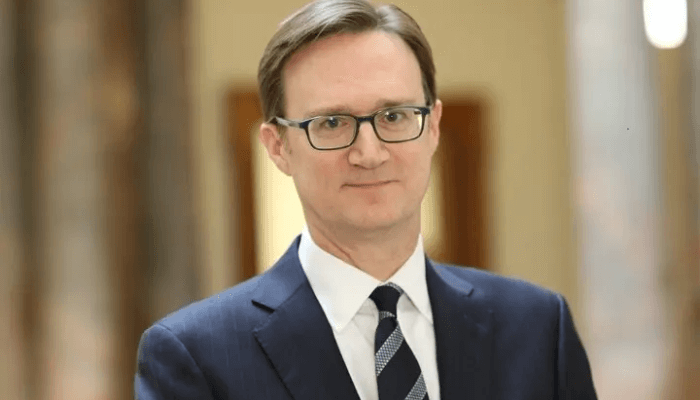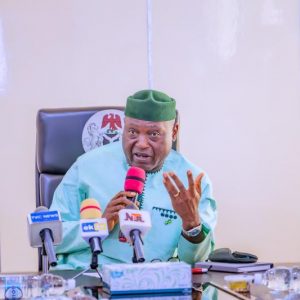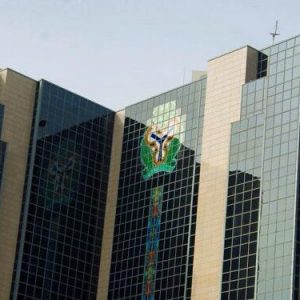Richard Montgomery, British High Commissioner to Nigeria
…As bilateral trade stands at £7.9bn
Richard Montgomery, British High Commissioner to Nigeria, has said that there is an increased interest from United Kingdom (UK) investors, who are seeking to tap into opportunities in Africa’s biggest oil producer.
He said Nigeria’s reform agenda, although challenging, is producing measurable results that are attracting long-term capital.
Nigeria is fast becoming a focal point for British investors as sweeping economic reforms take root and bilateral trade between the two countries hits a record £7.9 billion (N16 trillion).
Montgomery told BusinessDay that the growing investor confidence across sectors like technology, finance, energy, agriculture and creative industries reflects a fundamental shift in UK-Nigeria relations—from aid dependency to a strategic, growth-oriented partnership.
“Nigeria does not want a donor; it wants a partner. That is precisely the role the UK seeks to play,” Montgomery said in an exclusive interview with BusinessDay in Abuja.
This optimism follows a landmark visit by David Lammy, the then UK foreign secretary and now deputy prime minister last November, who made Nigeria his first stop on the continent. That trip culminated in a strategic partnership agreement signed by President Bola Tinubu and Foreign Minister Yusuf Tuggar, formalising cooperation on trade, defence, migration, and foreign policy.
Central to this partnership is the Enhanced Trade and Investment Partnership (ETIP), which Montgomery described as a key vehicle to “unlock jobs and investment in both countries.” The agreement targets several high-potential sectors, including financial services, technology, creative industries, higher education, agriculture, clean energy, and health. Through ETIP, both countries aim to align regulations, streamline institutional collaboration, and deepen trade ties.
Montgomery acknowledged Nigeria’s economic difficulties, including persistent inflation and weak currency, but stressed that reforms are crucial to bridging the gulf between population growth of and sluggish GDP growth.
“Reform is essential to close that gap,” he said, crediting President Tinubu, Finance Minister Wale Edun, and Central Bank Governor Yemi Cardoso for steering the turnaround.
Key indicators back this up, as inflation has eased from above 30 percent to near 20 percent. Foreign reserves have climbed to $42 billion, and fiscal allocations to Nigerian states have increased, enhancing fiscal stability.
Investor sentiment has shifted from short-term speculative trading to more sustainable equity investments and longer-term loans, driven by clearer economic policies and a more predictable business environment. The UK’s development finance institution -British International Investment (BII) – is playing a leading role, managing a Nigerian portfolio nearing £700 million, focused on agribusiness, small businesses, and clean energy projects.
According to Montgomery, UK’s strategy has moved beyond traditional aid, now accounting for just one percent – two percent of Nigeria’s GDP, towards reform-backed investment that fosters health and education improvements, boosts civil service efficiency, and raises agricultural productivity. To this end, the UK has committed $7.5 million specifically to Nigerian agribusiness, aiming to increase productivity and meet export standards.
He noted that more than 3,000 Nigerian products already benefit from tariff-free access under the UK’s Developing Country Trading Scheme. However, he cautioned that non-tariff barriers—such as stringent packaging requirements and certification hurdles—still limit Nigeria’s export potential and called for enhanced standards to expand market access.
Technology and the creative economy are new frontiers for UK investment. Recent UK-led tech missions, including one by London Mayor Sadiq Khan, have established partnerships with Nigerian startups, opening channels for innovation and entrepreneurship.
“UK universities are equally exploring joint campuses in Nigeria to reduce outbound student migration,” Montgomery noted, pointing to education as another pillar of deepening bilateral ties.
He also lauded Nigeria’s Federal Inland Revenue Service (FIRS) for adopting reforms inspired by the UK’s HM Revenue and Customs, which have improved tax collection efficiency without raising rates—a vital step for sustainable government revenues.
On immigration, Montgomery addressed concerns about the UK’s visa restrictions, noting that recent changes, such as limits on dependents for international students, apply globally rather than targeting Nigerian applicants specifically.
“Nigeria remains one of Britain’s biggest migration partners, with 260,000 visas issued last year alone,” he said. “Our visa relationship with Nigeria is larger than with all 27 EU countries combined.”
Approval rates remain high, with 95 percent for study visas, 70 percent for work visas, and 60 percent for visit visas. Montgomery urged applicants to avoid fraudulent documentation, which has become a rising concern.
Security cooperation remains a cornerstone of the UK-Nigeria relationship, he also noted. Through the UK-Nigeria Security and Defence Partnership, the UK has provided critical support, including counter-IED training, intelligence sharing, and equipment deliveries such as a $500,000 package to enhance Maiduguri’s coordination cell in the North-East, a frontline against insurgency.
The UK also supports Nigeria’s anti-kidnap fusion cell under the National Security Adviser’s office, credited with several successful rescue operations.
Montgomery warned of broader regional instability, citing conflicts in Sudan, Mali, and Niger exacerbated by Russian mercenary activity that threatens to spill into the Sahel region.
Despite these challenges, he praised Nigeria’s leadership in regional diplomacy and counterterrorism efforts within the Lake Chad Basin.
“The UK will continue to support Nigeria when invited, through training, technical expertise, or intelligence sharing. But the leadership of Nigeria’s security architecture is crucial, and we have confidence in their ability to chart the right path,” he said.
Stay ahead with the latest updates!
Join The Podium Media on WhatsApp for real-time news alerts, breaking stories, and exclusive content delivered straight to your phone. Don’t miss a headline — subscribe now!
Chat with Us on WhatsApp







